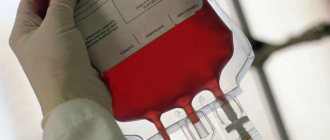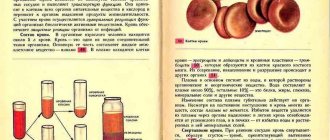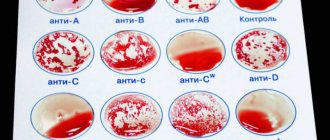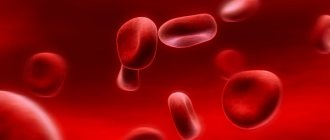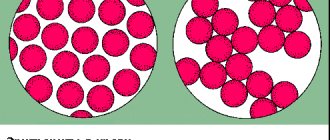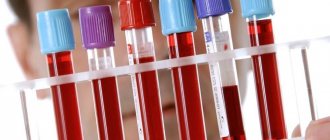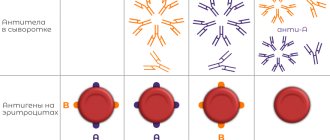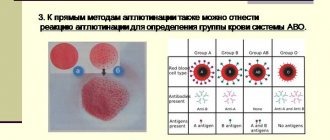negative Rh factor, pixabay.com Human blood is divided into 4 groups and 2 types of Rh factor. The most common group is No. 2, and Rh is positive. Moreover, such information was discovered not so long ago - 120 years ago. In 1900, the Austrian doctor K. Landsteiner learned about the existence of different types of blood, for which he received the Nobel Prize in 1930. Now this discovery saves millions of lives every day.
Let's get back to the main point. While most people still have at least some understanding of blood groups, not everyone knows about the Rh factor. In fact, even scientists have not been able to fully figure out why the factor is needed. But doctors say that knowing the group and Rh is vitally important. This is true. Because such knowledge allows doctors to transfuse blood to patients, saving their lives.
We propose to consider 4 main issues using the material in our article. The information will be useful for people with a negative Rh factor, since their body has certain features that are worth knowing about.
What does Rh negative mean?
Which Rh factor is better?
- How dangerous is negative Rh and what should people with this type know?
- Features of negative Rh in women?
- Interesting facts about negative Rh factor blood.
“As statistics show: 40% of people of the white race have a positive blood type, while Asian people are characterized by negative Rh. Only 27% of Asians live with a positive blood type, the remaining 73% live with a negative blood type.”
Support the publication
- Join the CLAN
Or
“The first trial of blood transfusion was carried out in 1600. It failed. Not surprising, because scientists took liquid from animals in an attempt to save their patients. But, as Blundell, a British gynecologist, later found out, such treatment is only permissible with the help of human blood. Although four of his 10 patients who received blood transfusions survived, he did not stop and carried out further research.
How did the fourth group appear?
It is believed that during the formation of human society, gene mutations occurred. This also applied to blood type. The fourth one arose last as a variant of the second and third. About a thousand years ago there was a mixing of the genetic groups of Indo-Europeans and Mongols.
It has been established that there are spots of this particular group on the Shroud of Turin. This makes it possible to classify Jesus Christ as a bearer of rare blood.
Children can get AB (IV) if the parents have the second or third group, and this type will never be formed if one of the parents has the first group.
The laws of inheritance are studied by medical genetics and used in judicial practice.
Signs of incompatibility
If the victim is infused with inappropriate donor biomaterial, this will cause specific symptoms. More often there are such deviations:
- Study: which blood type is considered the best: positive and negative aspects
- The patient becomes restless.
- The occurrence of discomfort and sharp pain in the lumbar region. This marker indicates that changes have begun to occur in the kidneys.
- Pallor of the skin.
- Increased breathing, shortness of breath.
- Increased body temperature or chills from feeling cold.
- Hypotension.
- Bacterial toxic shock. The violation is rare and occurs due to infection during transfusion.
5% show the following symptoms:
- Nausea and vomiting.
- Turning blue.
- The occurrence of severe convulsions.
- Involuntary urination and defecation.
In rare cases, there is a possibility of hemolytic shock. With this complication, it is necessary to immediately save the patient.
What kind of blood can be transfused?
Transfusion of fresh blood is prohibited by the Instructions of the Ministry of Health. Only red blood cells or other blood products are allowed to be used. But doctors know emergency situations in case of injuries, heavy bleeding, when a person’s life depends on the urgency of replenishing the bloodstream. In such cases, even direct transfusion from donor to recipient is justified.
In an emergency, the blood transfusion station prepares its supplies of blood substitutes and calls donors
Since it is very difficult to find a single donor for an AB (IV) Rh (-) case, transfusion of any Rh-negative blood is suitable. In this sense, people with the fourth group are considered “universal”. Because they already have agglutinogens A and B, additional administration from the second and third groups will not cause a reaction, and in the first group there are none at all.
A test for individual compatibility is mandatory, even with a planned transfusion.
Compatibility of men and women
Since those with the fourth blood type are considered universal and at the same time unique, the perception of their intimate life is significantly different from other people. The fact is that girls and guys in this category love to receive great attention to themselves. Their chosen ones will also have to be different from other people in order to satisfy their “halves” and build a happy marriage.
It is worth noting that marital unions with people of the fourth type are often long-lasting. The carriers of this group are always attentive, caring, faithful and reliable, even if they marry the owners of the first or third groups. Due to such character qualities, strong and long-term families can be formed, especially among those couples who manage to give birth to healthy offspring.
( 1 ratings, average: 5.00 out of 5)
Problems during pregnancy
For a pregnant woman with positive Rh and blood type IV, problems can only arise with bleeding during childbirth. Because there are difficulties with selecting donors.
During pregnancy, special conditions arise only if the mother does not have Rh in the blood and the father is Rh positive. In this case, the child can choose the man’s genes, and the mother’s body will begin to produce antibodies to the fetus.
If the child prefers the maternal genes, then this will not affect the pregnancy at all.
This reaction is called a “Rh conflict”. It is dangerous for both the mother and the unborn baby. The formation of organs and systems of the fetus is disrupted. There is a predisposition to interruption in the early stages.
During the first pregnancy, a sufficient level of antibodies accumulates only towards the end of the term, and the child’s body is minimally affected. The situation is especially dangerous during the second and subsequent pregnancies, which do not necessarily result in childbirth. Even after an abortion, antibodies have already appeared in the body of a Rh-negative woman. They begin to attack the unprotected fetus and cause complete rejection.
Blood compatibility for conception
Family planning is a very good direction in obstetrics, which has significantly reduced the number of complicated or unwanted pregnancies. This was manifested by the birth of fewer seriously ill children. Today, every woman knows about all the threats that can await her and her child if she has a cold-blooded attitude towards some of the details of proper family planning. One of these details is the compatibility of the blood of sexual partners.
In fact, this topic is a little misunderstood in the media. Everyone who has misunderstood it interprets everything in their own way, spreading unreliable and, most importantly, untrue information. In this regard, it is worth considering the issues of immunological compatibility of spouses and blood compatibility of spouses at conception, which were mixed with each other and are discussed as one and the same problem. This spreads panic and forces people to search for a non-existent truth. Therefore, it is important to understand that:
- The compatibility of spouses when a woman is unable to get pregnant depends not on the compatibility of blood groups or the Rh factor, but on the immunological compatibility of the woman and the man. This means that antibodies are produced to the components of a particular male sperm in the woman’s body, which simply does not perceive it. The group and the Rh factor have nothing to do with it at all;
- An Rh negative mother can give birth to a baby with Rh positive blood. This can only affect the course of pregnancy and the condition of the fetus, but cannot be regarded as incompatibility with the Rh factor for conceiving a child;
- A couple with different Rh factors can easily have healthy children. There is no need to ruin relationships because the Rhesus of the mother and fetus could potentially be incompatible. But you should definitely follow the family planning recommendations that experts will point out. Some of these recommendations are listed in the next section.
It is impossible to reliably predict the development of Rh-conflict pregnancy.
Prevention
To prevent such unexpected situations, obstetricians and gynecologists check whether the parents are matched by Rhesus. All adults are advised to know their blood type and Rh.
Antibodies are examined by immunological tests
During pregnancy, it is necessary to determine the onset of antibody production as early as possible. To do this, the woman is sent for a specific blood test.
Women with group AB (IV) Rh (-) are recommended to administer anti-Rhesus globulin in the first three days after abortion or childbirth. The technique has proven itself and allows you to have two or more children.
In the case of AB (IV) and positive Rh, the expectant mother does not have such problems, even if the father does not have Rh.
How does the Rh factor of parents affect the child?
It is known that if a woman has a Rh factor of “-” and a man has a Rh factor of “+,” then a serological conflict arises.
How does the Rh factor affect the unborn child?
Serological conflict is a disorder primarily affecting women with the Rh- blood type who have children with an Rh+ male. This phenomenon causes hemolytic disease of the fetus or newborn. The essence of the problem lies in the mother's production of antibodies that destroy the fetus's red blood cells. This leads to anemia and many other serious complications.
It should be noted that a serological conflict rarely occurs during the first pregnancy, since the mother's immune system does not yet produce antibodies to the Rh factor.
Rh conflict during pregnancy appears no earlier than 16 weeks after conception. If antibodies are not detected by 20 weeks of pregnancy, they are unlikely to appear.
Rhesus - conflict resembles a mechanism of defense against viruses, when resistance is formed by the immune system to destroy the “enemy”. While in the case of pathogenic microorganisms the phenomenon has a beneficial effect, in the case of a serological conflict the effect is completely opposite, since it causes pathological conditions in the child.
As a result of inheritance, the fetus receives antigenic characteristics from both the mother and the father. During pregnancy, due to the penetration of fetal blood cells into the mother's blood circulation with the antigenic characteristics of the father (which the mother does not have), the mother begins to produce antibodies directed against these antigens.
The most famous and important example of serological conflict is the difference in Rh cell antigens in the fetus and mother. The formation of antibodies in a woman's circulation occurs when the fetus inherits the father's "D" (Rh+) antigen and the mother has the "d" (Rh–) antigen.
The resulting antibodies to the Rh factor enter the baby's circulation and cause damage to blood cells, leading to hemolytic disease.
The mildest form of hemolytic disease is the destruction of a child's blood cells. The child is born with anemia, which is usually accompanied by an enlarged spleen and liver, but this does not pose a threat to his life. Over time, the blood picture improves significantly and the child develops correctly. However, it should be emphasized that in some cases anemia is severe and requires special treatment.
Neonatal jaundice is another form of hemolytic disease. The baby looks quite healthy, but on the first day after birth, a jaundiced color of the skin begins to appear. There is a very rapid increase in bilirubin, which has a toxic effect on the child’s brain and liver.
The final and most serious form of hemolytic disease of the newborn is generalized fetal edema. As a result of the destruction of the baby's blood cells by the mother's antibodies (still at the stage of intrauterine life), blood circulation is disrupted and vascular permeability increases. What does it mean? Fluid from the blood vessels leaks into nearby tissues, causing internal swelling to form in important organs, such as the peritoneum or the pericardial sac that surrounds the heart. Unfortunately, edema is such a serious pathological condition that it usually leads to the death of the child in the womb or immediately after birth.
Features of people with a rare group
The Japanese especially believe in the characteristics of people with different blood groups. Many followers have appeared in Russia, so we will try to characterize a person of only group AB (IV).
How long can you think without being considered indecisive?
In contrast to the first group, the fourth makes a person soft and patient. He is respected for his knowledge, philosophical way of thinking, and ability to offer a unique way to solve a problem.
Such people are good in humanitarian professions and science. They are purposeful and friendly. The ability to empathize and sympathize leads them to medicine and acting.
Weaknesses include indecision, procrastination when it is necessary to act immediately, and the need for support and attention from others.
Dietary recommendations
For those who use D'Adamo's theory of the dependence of healthy nutrition on blood type, we will present product recommendations for creating your individual diet.
It is important to cook fish dishes
- The preferred meat products are lamb, rabbit, turkey, and liver.
- Tuna, sturgeon, and trout are considered especially useful. Limit crabs, crayfish, and shellfish.
- Egg no more than one per day, up to four per week.
- Low-fat fermented milk products (kefir, cottage cheese) are well absorbed. It is recommended to limit whole milk. Only hard varieties of cheese are shown.
- Fruits and vegetables are needed fresh, compotes. Bananas, oranges, bell peppers, pomegranates, and persimmons are not recommended.
- It is necessary to eat porridge made from rice, buckwheat, and oatmeal.
- Attention is drawn to the need for nuts and vegetable oils. Olive oil is recommended, but sunflower, sesame and flaxseed oils are not recommended.
- Drinks include fruit and vegetable juices, black and herbal teas, coffee is limited.
- Legumes, corn, and seeds are not recommended in the diet.
Attention is drawn to the tendency of people with the fourth group to be overweight. Therefore, the theory calls for monitoring blood sugar and preventing high cholesterol.
We note the absence of unusual combinations or beyond the requirements. The products are quite accessible to everyone who wants to eat in accordance with the theory. We must not forget about rational physical exercises.
We get our blood type from our parents. We are not able to change it. All that remains is to adapt and come to terms with the peculiarities.
Description of suitable nutrition
Since people with group IV and a negative Rh factor have a disappointing health profile and are at risk of developing anemia, they should take care of a properly balanced diet and intake of vitamins.
Thanks to numerous scientific studies, important foods have been identified, the consumption of which leads to the normalization of weight, mineral and vitamin balance in the body. It is recommended to include in the menu exactly those foods that help speed up metabolism and lose weight. In this case, it is first necessary to determine the compatibility of food with the blood type, so as not to cause harm to the body.
Read also: What functions does calcitonin perform, diagnosis of cancer using a blood test
For those with AB(IV) blood who are Rh negative, it is recommended to limit recipes to dishes from the following list:
- Liver and other offal,
- Red beef meat,
- Beans in any form
- Corn and porridge made from it.
Regarding seafood and fish, it is worth saying that this item of the diet requires a lot of attention. Ideal for carriers of the fourth group are mackerel and river fish: carp or perch. But you will have to forget about all types of red fish and smoked seafood forever.

